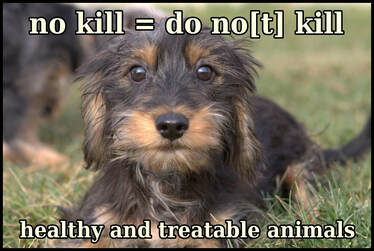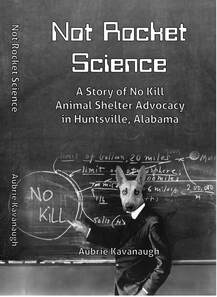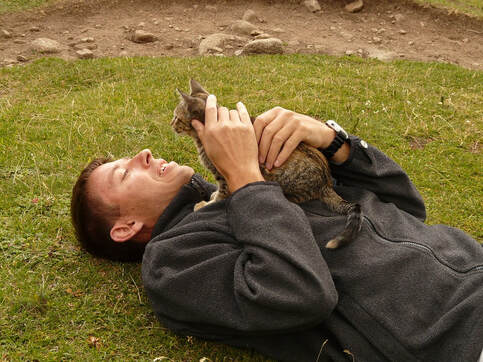|
We had our 16 year-old dog, snake, euthanized on April 22nd, 2016. We didn't realize until later that it was Earth Day. She had been degrading for a while and we knew the day was coming soon, but we didn’t really plan for it to happen that day. We got up on a Saturday morning after Snake had a difficult night, looked at each other, and decided. Rich called our veterinarian to come to our house, something we had arranged years earlier. Snake have been deteriorating for a long time and her quality of life was really poor by that point. She had some good days. She had some bad days. Snake was incredibly athletic in her prime and incredibly smart. She was a sight to behold. But the bad days had begun to outnumber the good and she was having cognitive issues. We could have done it sooner. We could have waited longer. Because we knew the time was coming, Rich had been working for months on a beautiful wood casket which was suitable for a child. I believe that when we make decisions out of love, there is no right time and there is no wrong time. We just have to follow our hearts and trust that we are alleviating or preventing suffering out of love. That if the roles were reversed, we would be shown the same mercy. There are some events in life which can be described as Before and After events. You consider yourself one person before the event. You are different either immediately after the event or you become different afterwards through a process. For me, the loss of Snake was a Before and After event. The people closest to me would tell you that I was one person before. And that I became a different person after. I see this as having been a process which happened over time. I did not cope particularly well after Snake left us. I knew we had made the right decision, but I just felt broken inside. If not for the support of my husband and our other dog, I'm not sure what would have happened to me. My focus was terrible. Even though I took a few days off of work because I could not stop crying, I still could not stop thinking about her after I returned to work. I know there were days when I drove to and from my office, but have no memory of having done so after I arrived. I’m lucky I didn’t cause an accident. Snake was such a wonderful and unique creature that I felt the need to do something to honor our years with her. I told myself I would feel better if I could turn my tears into action. I began donating to the municipal animal shelter in the city where I work to turn my grief into something positive and to try to help other animals in Snake’s honor. It was as a result of this engagement with the shelter that I learned that healthy and treatable animals were being destroyed there not because there too many of them, but because that was what had been done for years without question. That knowledge led me to my tipping point which led me to educate myself on a variety of animal welfare issues, causing me to become an animal welfare advocate and (more specifically) a no kill advocate. I know exactly what euthanasia means. What happens to healthy and treatable animals in our nation’s shelters is not euthanasia. It is killing them and it has to stop. Losing Snake turned me into a different person. Many who come to animal welfare advocacy through loss will tell you that there is no going back. You cannot “unknow” what you have learned. Some of us just live with the newfound knowledge. Some of us act on it. As I told Mike Fry of No Kill Learning during a recent visit related to his Boots on the Ground mini-documentary series, advocating for animals is a moral imperative for me. This is not just a matter of how tax dollars are spent related to animals. It’s a matter of values and ethics. I don’t want my money used to kill animals when that same money can be used to keep those animals alive. I am quite outspoken about this view in the area where I live and using this Paws4Change platform I developed in my early After days. Today is Earth Day. Snake has been gone for thirteen years. In some ways it feels like forever. In other ways it seems like just a few years. I think of her every day. When my advocacy gets difficult or uncomfortable or puts me in conflict with others, I remind myself that there are so very many dogs just like Snake in our animal shelters today and most of them will not make it out alive. Which is the biggest tragedy of all.
The details of my story about losing Snake and my After related specifically to the city where I work is now set forth in my self-published book which is now available on Amazon. The book is called “Not Rocket Science: A Story of No Kill Animal Shelter Advocacy in Huntsville, Alabama.” I hope you will consider reading the book and that it helps you in some way. It is priced to print, which means I’m not making any money from the book. This is just part of my After as I continue to channel grief from losing Snake and later losing my parents. Life is short and beautiful and tragic and magical and all of our days are numbered. I’m just trying to make the best use of my time here and I hope you will do the same.
0 Comments
During my Army days, there was a saying used often which has stuck with me over the years. You may have seen it on a t-shirt. The saying goes, “the beatings will continue until morale improves.” The natural reaction is to think, well, wouldn’t morale improve if the beatings stopped? Of course if would. I was reminded of this phrase yesterday when an old article about animal rescue was making the rounds on social media for the umpteenth time. It should have been called “you are to blame but please help us rescue now.” The natural reaction, for me, is that if you stop blaming the public, they may help you more and may make better choices. The 2014 article said the following things about animal rescue. • dog owners tend to have a lot of misconceptions about rescue groups. . .and what their job is in society. Spoiler alert: it’s not to fix your problems. • It’s not our job to fix your basket case. • If you decide your dog needs a home, do it yourself; it’s really not our job. • If you didn’t spay your dog, and now you have [puppies], that’s your problem, not ours. • You disgust me. • You thought you were good enough for that dog in the first place, now prove it. Wow. Tells us how you really feel (yes, that’s sarcasm). Animal rescue is not for everyone. It is often a thankless, dirty, heart breaking, frustrating and expensive venture. Many rescuers I know work full-time jobs and spend a lot of time and a lot of their own money working incredibly hard to keep animals alive. Some have what I call “life balance.” Their focus is on helping animals, but they fully realize they cannot help all animals and so they do the best with the resources they have. They learn how to say “no” to people politely and then refer people who need help to other rescue groups or organizations which may be able to help them resolve issues they are having. They work hard to help each animal, one at a time, and then go on to help other animals when time and resources allow. Then there are others whom I can only refer to as angry rescuers. They are perpetually angry with the public, whom they view as the enemy. They do not hesitate to vent or rant about the people seeking their help and whom they view as outrageously irresponsible, making the lives of rescuers unreasonably difficult. News flash. Problems with companion animals are not animal problems, they are people problems. And whether rescuers like to view their role this way or not, theirs is a customer service based function in our society I feel confident that most people in animal rescue mean well and entered the rescue field to help animals in need find new homes. But the reality is that you cannot separate the animals in need of help from the people who may seek help unless you do not deal directly with the public and you only remove animals from animal shelters. Yes, there are irresponsible people who should never have companion animals, some of whom behave in ways which are criminal at worst and negligent at best. I genuinely believe, however, that the majority of people who share their lives with dogs, cats, rabbits, birds, snakes, ferrets, hamsters and other companion animals mean well. They may not always make the best decisions, but most of them lack malice. I also believe that most people can be educated to make better decisions about animals if we check our judgment at the door and presume the best of people and not the worst. Should people get their pets spayed and neutered? Absolutely. When they don’t, that does not mean they hatched some evil plan in the dark of night to keep a pet from being sterilized for the sole purpose of having a litter of puppies or kittens they then need help to place. I can’t count the number of times people have asked me for help to place a litter of animals and when I ask them about spay or neuter of the parent animals, they either say, “I meant to do that but thought I had more time” or “I wanted to do that but my veterinarian wanted hundreds of dollars and I just could not afford it right away.” Should people make plans to re-home their pets themselves in the case of some life emergency? You bet. When people don’t, that does not mean that they don’t care enough. I believe strongly that we should all have what I call Pet Parents in the event of our death, serious illness or some life tragedy that puts us in a position where we have to re-home our pets because we can no longer care for them. When people do not make plans and they need help, they are not evil or uncaring. It more likely than not means they did not take seriously the possibility that life would change very suddenly and that their family and friends may not be lining up to take their pets and care for them the rest of their lives. They may not have given enough serious consideration to a worst case scenario which may affect us all with no notice. Should people be prepared to fulfill their lifetime commitment to their pets? Certainly. The reality is that many people expect pets to know how to behave automatically and put little or no effort into decompression or training whether it is house training, walking on a leash, not jumping on people or furniture, etc. Many people also give little regard to the needs of dogs in terms of exercise and mental stimulation which help reduce bad behaviors brought on by boredom. This can lead to people becoming frustrated with pets who do not behave the way they expect and decide they are not worth the time and effort it takes. There are also situations when a person brings an animal into their home, only to encounter a conflict with an existing animal in the home which cannot be resolved even through the very best of efforts. I know some people treat pets as disposable and I know that lots of people need to be more responsible and live up to their commitments. For every person who gives up too easily, there are many more people who would go to the ends of the Earth to help or save their beloved companion animals. It helps to not lose sight of that. I am not a rescuer. I know how I like to be treated by rescue groups when I need help with some animal I have found; I am asking you to be mindful of the image you present to the public. I do volunteer work for and support rescuers and it is in that vein that I offer the following. The public is not your enemy. You cannot bash, rant about or otherwise blame the irresponsible public for your frustrations and then expect that same public to adopt animals from you, foster animals for you, volunteer to help you or donate to your rescue. You can’t have it both ways. Recognize privately that some people are awful, but don’t treat us all that way. We have plenty of options when it comes to which organizations we deal with and support. If you are too toxic, we will just put our support toward a more friendly rescue which doesn't view all people in the same negative light.
Learn to say no. You cannot help every animal in need. You cannot help every person who asks for help. If you cannot help someone who has asked you for help, tell them no and refer them to other organizations which may be able to help them. Let it go and move on. If they insist that it is your job to help them, just don’t respond to that type of bullying or pressure. Consider ways to help people make better choices so the need for you is lessened. Set up a spay/neuter fund to help offset costs of spay/neuter for animals owned by families of limited means. Offer free microchipping periodically to help lost animals get back home. Refer people to pet food resources in your community if they fall on hard times. If an animal is hurt and the family cannot afford the veterinary care, consider paying for the care to help keep the animal in the existing home. You can do targeted fundraising for any of these efforts. Doing so will cause people to see your rescue group as a resource to help not just animals, but to help people in the community overcome obstacles while still keeping pets in existing homes. Drop the attitude and try to keep your filter in place. As much as you may not like dealing with some people in the public, you have made yourself a public figure by making a decision to rescue animals. It is natural for people to seek your help whether you find them worthy of your time or not. Most have no clue of your existing obligations and have no idea what resources are available to you. Our ties to animals are emotional and when we are desperate, we often don't think clearly or communicate well. Please forgive us our shortcomings. If you hope to preserve your reputation toward getting more public support, be mindful of what you say to people in person, in email messages and on social media. Take the high road even if you are fuming or exasperated internally and then find a way to release your stress other than with your words. Try to focus on the positive. Every animal you help is a success story. Every family you help is something in which you can take pride. Rescue is really hard work and not everyone can do what you do. It takes passion, commitment, patience and creativity. Focus on the lives you save. Focus on what you know you can do with the resources you have. There’s a lot of bad out there, but there is more good than bad. Take time for yourself and try to seek balance. Knowing you cannot save every animal and help every person, remember that you cannot help anyone if you do not take care of yourself. Set boundaries, do things just for you periodically and learn how to disconnect when you get so stressed that every ask or every animal causes you anger. To do otherwise means you may ultimately flame out and not just walk away from rescue, but run from it. If you have not been out to dinner, seen a movie or read a book in the last six months, it's time for a break. No one wants you to be so incredibly unhappy that it affects your mental health or your own personal well-being. The suicide rate in the rescue community is higher than some may imagine. If you find yourself feeling so overwhelmed and hopeless that you are tempted to give up not just on rescue, but on yourself, please step away from rescue and seek help. Nobody likes an angry rescuer. Please don’t be that person who helps animals, but who hates people |
AuthorI am an animal welfare advocate. My goal is to help people understand some basic issues related to companion animals in America. Awareness leads to education leads to action leads to change. Archives
July 2024
Categories
All
image courtesy of Terrah Johnson
|







 RSS Feed
RSS Feed